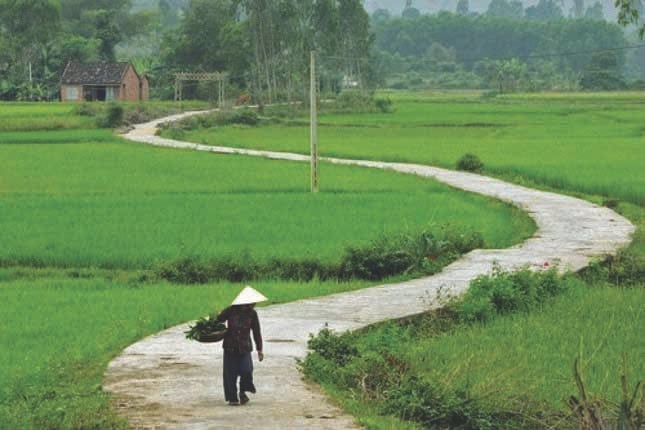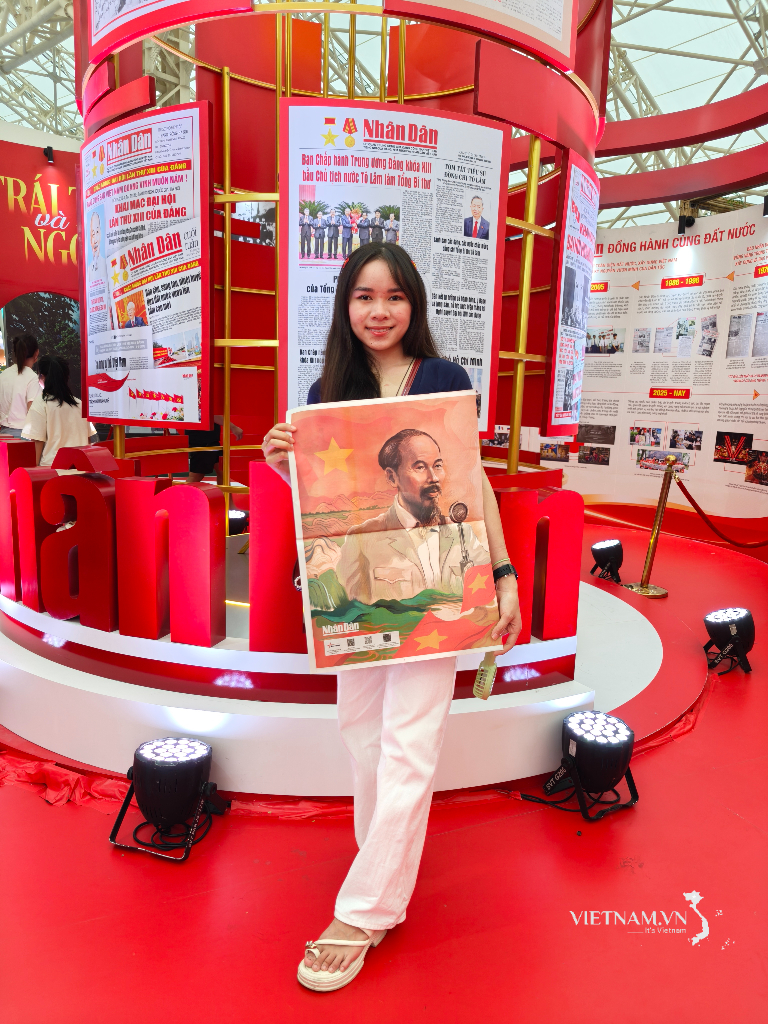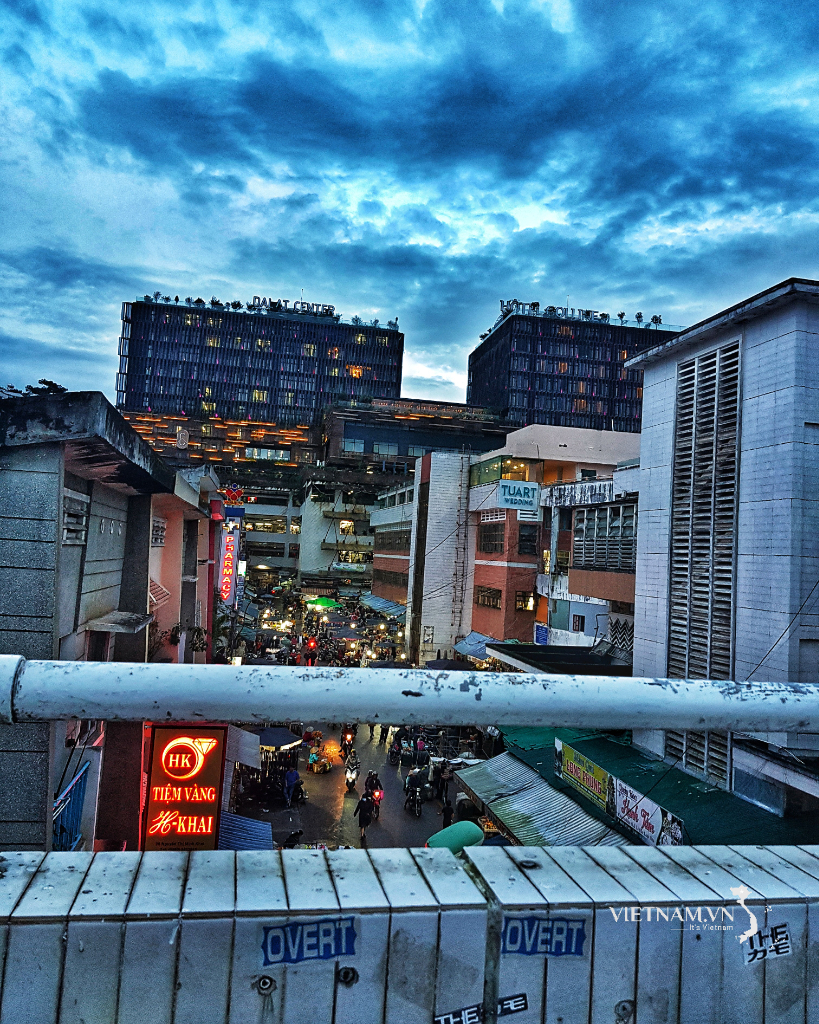Back then, whenever I drifted along the small stream during the high water season, I would often dream of wide, long rivers, the kind I had once seen on a black-and-white battery-powered television screen, or read about somewhere in worn-out, tattered books and newspapers.
At nine years old, during summer vacation, I went to stay at my aunt's house, babysitting for my older brother and sister-in-law, at their request. They were struggling to make ends meet. From then on, the story of my aunt's life, longer than a river, flowed through me. From then on, besides my mother, the second most important woman in my life was my aunt, who always taught me good things and right principles, influencing my thinking and way of thinking later in life.
 |
| Source: Internet |
For my first meal, my uncle treated me to stir-fried snails. The snails were unusually long, and their meat was crispy, delicious, and fragrant. I asked him what kind of snails they were. He said they were stream snails. It was completely strange; I'd never heard of them before. My uncle took me to the bathing area. That's how he called the stream "stream." I blurted out, "Why not just 'stream'?" He thoughtfully explained that he was used to calling them that, just as he always had. From then on, I only remembered "stream." To my uncle, "stream" was very important.
The stream provided a constant flow of clear water, enough for washing basins of clothes every midday and for carrying water to irrigate plants during droughts. The stream had many flat stones where the old woman could sit and rest after washing. The stream gave her delicious snails, snails that cling to the rocks, feeding on the nutrients they provide. The stream also gave her fish and shrimp.
Besides looking after the grandchildren, I don't mind doing chores around the house. Sitting with my aunt, she would pick black beans, the shriveled and bad ones; she would pick peanuts, the withered and wrinkled ones, while she would whisper stories about her life. My aunt passed away young, when my eldest sister had just gotten married and my youngest brother was only eleven years old. She single-handedly managed the family, arranged marriages, and ensured all eight children were settled down. My father always said he loved his sister-in-law very much.
I stayed at my aunt's house for almost a month before my father came to pick me up. He said he missed me so much and wanted me to come home to him and my parents. He said that no matter how poor our family was, we wouldn't let our child "work away from home." So I went home. After spending almost a month with my aunt, I felt like I was part of the family, and the connection became even closer and more frequent over time. Sometimes, compared to my aunt's grandchildren, I was closer to her than anyone else, and I talked to her the most.
My dear, I feel sorry for my eldest sister. Her husband works for the government, while she stays home and works in the fields. Their differing ways of thinking make life difficult. I feel sorry for my second brother, who stays in the city, far from his mother and siblings, alone and struggling to make a living. I feel sorry for my third brother, whose career is still uncertain. I feel sorry for my fourth sister, whose husband and she have completely different personalities, like the moon and the sun. I feel sorry for my fifth brother, who is sick and frail. I feel sorry for… How much I feel sorry for him! Can love ever be measured?
Years passed. The fifth son died first, from a serious illness. The grandmother grieved for the deceased, but even more so for her daughter-in-law, who was just like her. Seeing her youngest daughter-in-law ask her husband to pump up her bicycle tire, the grandmother also shed tears. Her sister-in-law had a husband who shared even the smallest tasks, while her fifth daughter-in-law was left to raise two young children alone, completely self-reliant.
I went to school, got a job, got married, had children, and was constantly caught up in the flow of life. Every year, I try to visit my aunt at least twice. Once during Tet (Lunar New Year), and the other time is usually after my father's death anniversary, right in the middle of summer. When I first arrive, my aunt always asks, "How long have you been back? How are your parents-in-law? Are they healthy?" And then the conversation just goes on, like a winding stream, flowing downstream, and it's hard to stop.
Neither my aunt nor I wanted to end the conversation midway. Before leaving, my aunt always held my hand tightly and gave me very careful instructions. "Remember, when you go back to your paternal grandparents' house, please send my regards to your parents-in-law."
Then my seventh brother died of cancer at a very young age. My love, literally "divided into five or seven," was given to my fifth sister-in-law and my seventh sister-in-law. My youngest brother also died suddenly not long after, from a cold. My aunt didn't cry. She said, "The leaves are turning yellow, and I'm watching the green leaves fall from the branch first. This pain, I don't know how to describe it properly, my dear." My aunt gently punched her chest. Then she gazed into the vast sky outside the door. Before her sorrow could subside, my second brother passed away, just as suddenly as my youngest brother. My aunt's tears were held back.
Life has changed, and the stream has also changed somewhat. The banyan tree was cut down long ago. At the bathing area and the base of the Nhội tree, there used to be a single wooden bridge, about the size of a water bucket, connecting the two banks of the small stream. Now, the wooden bridge has been replaced by two sturdy concrete bridges with railings, built with government investment.
The stream still meanders, dividing the Dong Ma field from the Lan Chieu field, near the limestone mountain range. The stream's rocks remain gray and silver, covered in moss. People come. People stay. People go. Only my grandmother remains, with her small house on the hill and her youngest sister-in-law. She diligently handles the housework and gardening, never resting, yet each day she still has hours, many hours, to sit aimlessly. My grandmother still holds my hand tightly whenever I return, still whispers countless stories of her life.
I fulfilled my childhood dream, traveling along countless rivers, big and small. The Red River, the Thai Binh River, heavy with red silt. The Duong River, "a sparkling stream." The Bach Dang River, marking ancient victories. The Ky Cung River flowing upstream. The gentle Bang Giang River. The tranquil Nho Que River. The Lo River – a legendary river. The Da River, with its clear blue water. The majestic Ma River. The poetic Perfume River. The Thach Han River, embodying the soul of the nation. The gentle Son River. The roaring Serepok River… But I still fondly remember my own stream and its banks.
In late autumn, I visited my uncle, returning to the old stream. The water had receded, flowing gently, revealing rocks that stood tall and majestic, enduring the passage of time, like my uncle's ninety-five years. My uncle was still remarkably sharp-minded, remembering every old person, recalling every young person, his eight children (though half of them had passed away), his sons-in-law and daughters-in-law, eighteen grandchildren, not to mention his great-grandchildren and great-great-grandchildren—a truly extraordinary memory.
To me, the old tree is like a rock, it is a rock, a stream rock. The rock has endured countless floods, yet remains steadfast and resilient. The old tree has endured countless seasons of bitterness, yet remains calm in the face of life's storms.
Source: https://baothainguyen.vn/van-nghe-thai-nguyen/sang-tac-van-hoc/202507/da-ngoi-45e0e23/













































































































Comment (0)